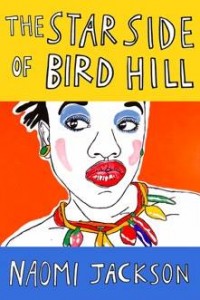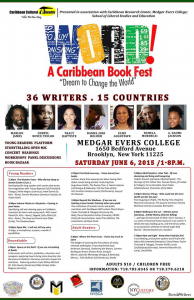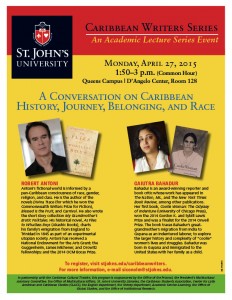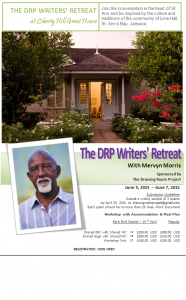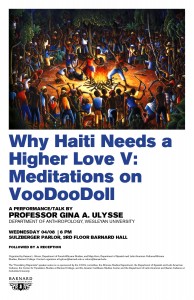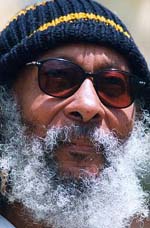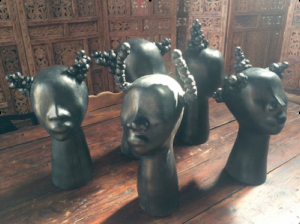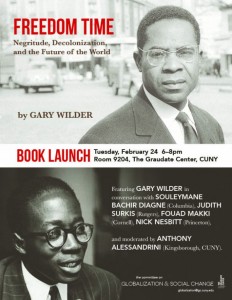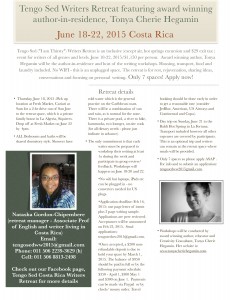Friday 17 April—Saturday 18 April 2015
Plangere Writing Center
302 Murray Hall
Rutgers University, New Brunswick, NJ
Conference organized by Carter Mathes and Yolanda Martínez-San Miguel and the Cluster of Critical Caribbean Studies, Theory and the Disciplines.
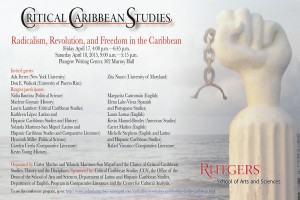
Schedule
Friday, 17 April
3:00 p.m.—3:30 p.m.
Welcoming Remarks
Carter Mathes (English and Critical Caribbean Studies, Rutgers-New Brunswick)
3:30 p.m.—4:30 p.m.
Screening of Documentary on Racial Inequality in Cuba
“Contra Las Cuerdas” (“Against the Ropes”) followed by Q&A
Moderator: Laura Lomas (English, Rutgers-Newark)
Amílcar O. Cárdenas (Asociación Cubana del Audiovisual)
4:30 p.m.—6:00 p.m.
Session 1
Reimagining Caribbean Studies: Slavery, Transnational Identity, and Contemporary Politics
Moderator: Kevin Manuel-Bentley (American Studies, Rutgers-Newark)
- Kevin Young (History, Rutgers-New Brunswick), “At the Crossroads of Empire and Republic: Native American Slaves in Nineteenth-Century Cuba and Mexico”
- Marlene Gaynair (History, Rutgers-New Brunswick), “WHERE’S THE BEEF? Food, Controversy and Citizenship Claims in the
Jamaican Canadian Community”
- Hyacinth Miller (Political Science, Rutgers-Newark), “Black, Foreign-Born and Elected: West Indians in New Jersey’s Elected Offices”
Respondent: Michelle Stephens (English and Latino and Hispanic Caribbean Studies, Rutgers New-Brunswick)
6:00 p.m.—6:45 p.m.
Reception
Saturday 18 April
8:30 a.m.—9:15 a.m.
Continental Breakfast
9:15 a.m.—10:30 a.m.
Session 2
“The Multiple Selves of James Bertram Clarke: A Model for Radical Caribbean Historiography”
Zita Nunes (English and Comparative Literature, University of Maryland)
Moderator: Margarita Castromán (English, Rutgers-New Brunswick)
Respondent: Carolyn Ureña (Comparative Literature, Rutgers-New Brunswick)
10:30 a.m.—11:00 a.m.
Coffee Break
11:00 a.m. —12:15 p.m.
Session 3
“A Black Kingdom of this World: Imagining Revolution in the Caribbean, 1812”
Ada Ferrer (History, Latin American and Caribbean Studies, New York University)
Moderator: Elena Lahr-Vivaz (Spanish and Portuguese Studies, Rutgers-Newark)
Respondent: Laurie Lambert (Visiting Researcher, Critical Caribbean Studies, Rutgers-New Brunswick)
12:15 p.m.–1:30 p.m.
Lunch
1:30 p.m.—2:45 p.m.
Session 4
“Language and Freedom in Anguilla: Understanding Creolization in a Marginal Colony”
Don E. Walicek (Department of English, University of Puerto Rico)
Moderator: Kathleen López (Latino and Hispanic Caribbean Studies and History, Rutgers—New Brunswick)
Respondent: Yolanda Martínez-San Miguel (Latino and Hispanic Caribbean Studies and Comparative Literature, Rutgers-New Brunswick)
2:45 p.m.—3:15 p.m.
Coffee Break
3:15 p.m.—4:45 p.m.
Session 5
New Caribbean Subjects: Ethics and Love in the Decolonial Imaginary
Moderator: Rafael Vizcaíno (Comparative Literature, Rutgers-New Brunswick)
- Nidia Bautista (Political Science, Rutgers-New Brunswick)
“Toward an Ethics of Scholarship: Locating the Intellectual”
- Carolyn Ureña (Comparative Literature, Rutgers-New Brunswick)
“Of Beloved and Other Demons: (De)Pathologizing Black Love in Morrison and García Márquez.”
Respondent: Carter Mathes (English, Rutgers-New Brunswick)
5:00 p.m.—5:45 p.m.
Closing Remarks
Laura Lomas (English, Rutgers-Newark), Yolanda Martínez-San Miguel (Latino and Hispanic Caribbean Studies and Comparative Literature, Rutgers-New Brunswick), Carter Mathes (English, Rutgers-New Brunswick)
Sponsored by: Critical Caribbean Studies (CCS), the Office of the Dean of the School of Arts and Sciences, Department of Latino and Hispanic Caribbean Studies, Department of English, Program in Comparative Literature and the Center for Cultural Analysis.
